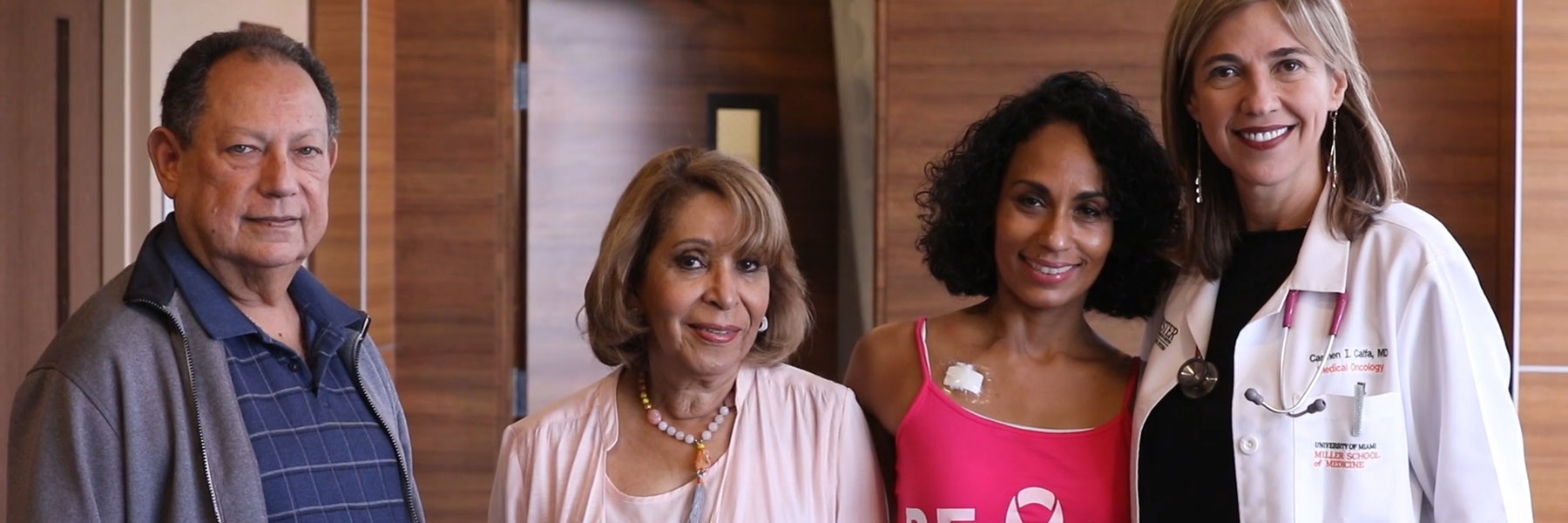Conquering Cancer with Chemotherapy

Sometimes chemotherapy is the right treatment choice. Or, at least it was for Frances Haddock who was recently diagnosed with triple-negative breast cancer, a more aggressive tumor that is harder to treat.
After hearing of her diagnosis from Dr. Carmen Calfa at Sylvester Comprehensive Cancer Center, she was given the option to have chemotherapy before having her tumor surgically removed. She was ready to fight and felt that chemo was the route to go if she wanted the cancer to leave and never come back.
Advances in modern medicine have given breast cancer fighters like Haddock a variety of treatments plans to choose from outside of traditional chemotherapy including new immunotherapies. A recent research study, TAILORx, even found that many women with early stage breast cancer could forego chemo all together though they would still have to have the tumor surgically removed.
Surgery only removes the cancer from a specific area of the body; however, and radiation only treats the area of the body at which it is aimed.
“While there are many breast cancer patients now able to forego chemotherapy, some women still need it and respond to it,” says Sylvester medical oncologist Dr. Alejandra Perez.
Your cancer is personal, so is your treatment
Whether you have chemotherapy as part of your treatment depends on what type of cancer you have, how big it is and whether it has spread or not. Doctors use chemotherapy because it circulates throughout the body in the bloodstream, so it can treat cancer almost anywhere in the body.
You might need chemotherapy:
- To shrink a cancer before surgery or radiation
- To stop cancer coming back after surgery or radiation
- As a treatment on its own if your type of cancer is very sensitive to it
- To treat cancer that has spread from where it first started
Immunotherapies, on the other hand, boost your body’s natural defenses to fight cancer by recognizing and targeting cancer cells. Cancer vaccines and checkpoint inhibitors are forms of targeted immunotherapy. They have specific targets, unlike chemotherapy that attacks fast-growing cells throughout the body. Some are FDA approved to treat certain cancers in specific patients, but not all of them respond to it.
“We are going to be the first ones using immunotherapy if the patient is eligible for that or if we think that is the best thing to do,” says Dr. Calfa. “However, there are other medications that we know work.” She advises not to give up chemotherapy if that’s what’s recommended first and that “although chemotherapy sounds really bad, just know that we have gotten really good at managing side effects and enabling women to raise their children, go to full time jobs and take care of their families with really good quality of life while in treatment.”
On her fourth infusion, Haddock who has a great support network with her parents and Dr. Calfa, says that she thinks of it as a day at the spa and that its “all about the attitude.”
Some women may find it a little more difficult to stay positive about chemotherapy as it begins to affect their energy level or in some cases lead to hair-loss. But, Dr. Perez emphasizes that the treatment team is there to lend support and encouragement.
“I tell them that going through this is three to six months of their lives devoted to them having a normal life after that, possibly 30, 40, or even 50 years,” she says. “What is three to six months compared to that?”
Videos produced by Sutta Productions.
Tags: chemotherapy, Dr. Alejandra Perez, Dr. Carmen Calfa, immunotherapy
